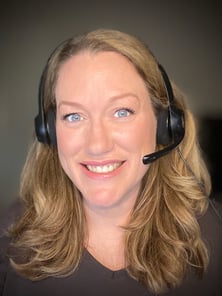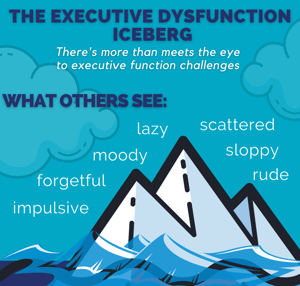Moments of quiet and calm - and eruptions of tears and frustration.
At night, a tangle of worried thoughts instead of restful sleep.
While this could describe daily life for many of us in 2020, our team has been particularly attuned to the new challenges that parents and professionals have been facing this year. How have we kept our fingers on the pulse?

During the past year, our Client Services Coordinators have had conversations with over a thousand individuals looking to learn more about Executive Function coaching and to determine if it’s a good fit for themselves or their kids. Sometimes, it’s just not the right time to begin the coaching journey. There may be mental health or other challenges that need addressing first, before a coach can have a positive impact. Most of the time, though, the folks we talk to have the right combination of frustration about their current situation and interest in making a change for the better that unlocks the real potential for coaching to be life-changing. We love those moments. That’s when we can hear the change in their voices that signals a hopefulness and optimism that had been hard to come by in the months - or years - prior.
As we reflect on this year, what are some of the themes that our team has observed in these phone calls during 2020? Let’s get a fly-on-the-wall perspective to learn more from our Client Services Team and their 1000+ conversations they had this year - and their best insights from 2020 for struggling parents and professionals.
Working parents were overwhelmed
Working parents had their most challenging year yet. Between managing their kids’ remote learning, as well as their own work demands, parents reported feeling like there was never enough down time to recharge - the very thing that we need most to manage stress and cope effectively with the day to day problems that inevitably crop up. Our Client Services Coordinator, Kai Simon, notes that the most common statement she hears is “Remote learning is not working for my kid.” The tech challenges are tough enough, but add in rigorous academic expectations for kids who are feeling emotionally depleted from the social isolation, and you have a situation that feels dire - and in need of immediate relief.
Remote learning had an unexpected perk
Although remote learning has been a significant struggle, Kai suggested that parents consider a hidden upside of working in close quarters with their child. Being within earshot can give you a perspective into your child’s challenges that you may never have had - and that presents an opportunity to find support for those weaknesses. Kai says parents have told her, “My kid does not have a diagnosis of ADHD or any other learning challenge, but I see the problems he’s facing every day.” Parents are noticing that their kids have more global difficulties that go beyond a messy backpack or bedroom - and recognize that they need support with developing their child’s Executive Function skills in order to better manage all aspects of their lives. The benefit of seeing your child’s challenges with a sharper lens is that it fast-tracks a path toward addressing those challenges. Kai’s advice? “Don’t feel like you have to solve every problem on your own - sometimes reaching out for help is the most powerful action you can take.”
Executive Function became more relevant in the US and beyond
2020 has seen a growing awareness across the country - and beyond - about Executive Function (EF) and its role in helping people manage their lives. Client Services Coordinator Jackie DeGroot has consulted with parents and professionals who first learned about EF from sources like online parent groups or social media. This was the spark that led them to google the term “Executive Function”, eventually leading them to us. We learned that clinicians in areas of Texas, as one example, were often faced with the dilemma of diagnosing a child with ADHD or another learning challenge, but not having a trusted resource to refer parents to for support - until they learned about our mission to help students gain EF skills. Jackie spoke with parents from Saudi Arabia, UAE, Australia, and England worried about the same things as US parents: How will my child be able to succeed in a complex world, with increasing demands, without the ability to self-manage effectively?
Self-advocacy paves a way toward balance
During these often emotional calls, Jackie stated that it helped to share her own challenges as the busy parent of a 3 and a 1-year-old. Parents were relieved when they could see they were not alone in their daily struggles, Jackie noticed. Her advice? Allow kids opportunities to self-advocate. It’s a critical skill they'll need for the future and when you can allow a student ownership of that process, it can ease the burden for an overworked parent. After all, school is a student’s job. The sooner they get some on-the-job training in asking for extra help or gaining clarification of class expectations, the better able students will be in shouldering some of the responsibilities that parents tend to take on themselves. That’s a clear win/win situation for you both!
Adults' Executive Function challenges had a real cost to self-esteem
Client Services Lead Janey Roth (pictured above) has had close to 100 calls in 2020 with adults who are overwhelmed with balancing their personal and professional lives. Ashamed of their inability to “do it all”, adults find themselves exhausted from trying to hide their struggles. Janey recalls one person revealing during a consultation, “I’m the CFO of a company and everyone thinks I have it together - but at home things are falling apart.” Others shared their inability to pursue a romantic relationship because they were ashamed of how disorganized their living area is - or that they can’t seem to find time to regularly incorporate other aspects of grooming and self-care into their lives because working remotely has removed the structure they required to keep up good habits.
Self-compassion forms the foundation for change
Janey’s advice centers on compassion and hope. She wants struggling adults to know that the most useful thing you can do is to show yourself the same compassion you show others. Too often, we expect perfection from ourselves and hold ourselves to unattainable standards. Instead, start with acknowledging the universal nature of struggling to cope with daily demands in a complex and rapidly changing world. From that kinder space, allow yourself to know that change is possible - and even small improvements in your habits (such as maintaining a daily schedule or more consistent sleeping patterns) can reap big rewards. Furthermore, those small successes can give you the confidence to know that you can make bigger changes to improve the quality of your life. It takes time. It takes patience. And you are worth both of those.
Here’s to a brighter 2021. We all deserve that!
 Students with Executive Dysfunction can hear 20,000 more critical or corrective messages before their 12th birthday vs. their peers. Our infographic encourages empathy for struggling students. Download now to see 8 skill deficits hidden under the iceberg!
Students with Executive Dysfunction can hear 20,000 more critical or corrective messages before their 12th birthday vs. their peers. Our infographic encourages empathy for struggling students. Download now to see 8 skill deficits hidden under the iceberg!

